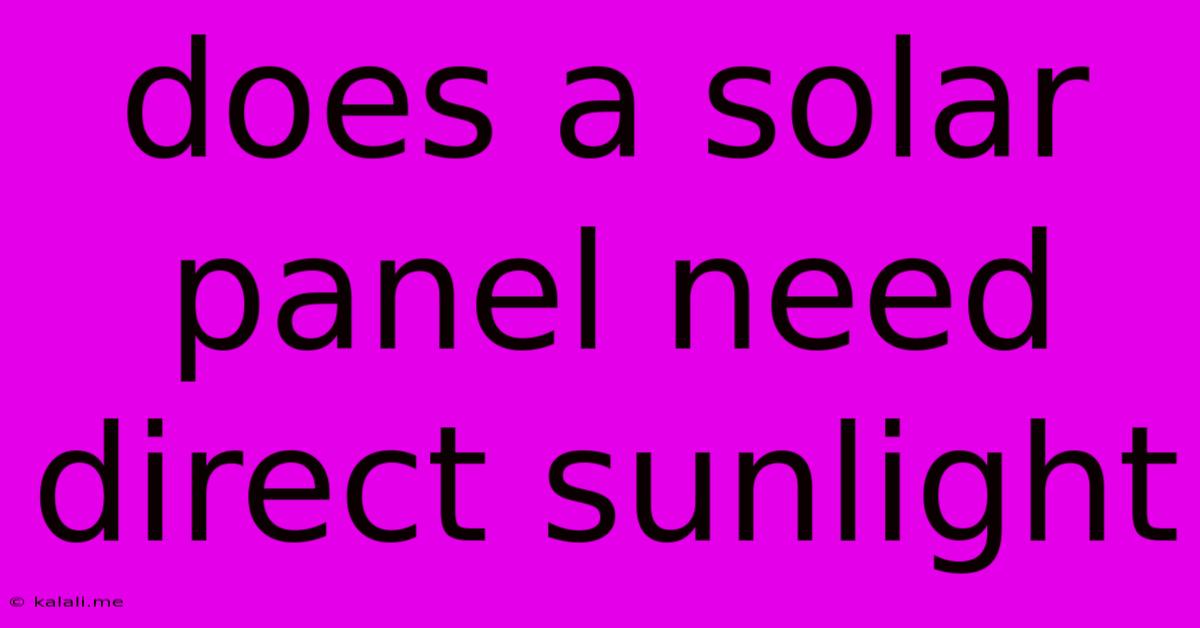Does A Solar Panel Need Direct Sunlight
Kalali
Jun 09, 2025 · 3 min read

Table of Contents
Does a Solar Panel Need Direct Sunlight? The Surprising Answer
Meta Description: Solar panels generate electricity even in indirect sunlight, but direct sunlight maximizes their output. Learn how shade, clouds, and the angle of the sun affect your solar panel's performance.
Solar panels are increasingly popular as a clean and sustainable energy source. But a common question arises: do solar panels need direct sunlight to work? The short answer is no, they don't need direct sunlight, but they definitely work best with it. Let's delve deeper into the fascinating relationship between solar panels and sunlight.
How Solar Panels Work: More Than Just Direct Sunlight
Solar panels, also known as photovoltaic (PV) panels, use the photovoltaic effect to convert sunlight into electricity. This effect occurs when photons (particles of light) strike the silicon cells within the panel. These photons knock electrons loose, creating an electrical current. While direct sunlight is the most efficient way to generate this current, even diffused sunlight – sunlight scattered by clouds or reflected from surfaces – can still produce electricity.
Think of it like this: even on a cloudy day, you can still see, right? The light is diffused, less intense, but still present. Similarly, solar panels can still generate power on cloudy days, though at a reduced rate.
The Impact of Shade and Clouds
Shade significantly reduces the output of solar panels. Even a small shadow cast on a portion of a panel can drastically affect its overall efficiency. This is because the shaded area acts like a bottleneck, limiting the current flow from the entire panel. This phenomenon is often referred to as the "shading effect." Therefore, careful panel placement and consideration of potential shading from trees, buildings, or other structures is crucial for optimal performance.
Clouds, on the other hand, have a less dramatic impact. While they reduce the intensity of sunlight reaching the panels, they don't completely block it. The amount of power generated will decrease proportionally to the amount of cloud cover, but the panels will still continue to produce energy.
The Angle of the Sun: Maximizing Efficiency
The angle of the sun also plays a vital role in solar panel efficiency. Solar panels are most efficient when they are positioned at a perpendicular angle to the sun's rays. This ensures that the maximum amount of sunlight strikes the cells. The optimal angle varies depending on geographical location and time of year, a factor to be considered during installation.
Indirect Sunlight: Still a Valuable Contributor
While direct sunlight is ideal, indirect sunlight is still a valuable contributor to solar panel energy production. This is especially relevant in regions with frequent cloud cover or during periods of the day with diffused sunlight. This means that your solar panels are still working, even if they aren't basking in direct sunshine.
Conclusion: Direct Sunlight is King, but Indirect Sunlight Still Matters
In conclusion, while direct sunlight is the most efficient source of energy for solar panels, they can still generate electricity in indirect sunlight. Optimizing panel placement to minimize shading and considering the angle of the sun are key factors in maximizing your solar energy harvest. Remember to weigh all these factors when planning your solar energy system. Understanding the nuances of sunlight's impact on your panels will help you make the most of this sustainable energy source.
Latest Posts
Latest Posts
-
How Many Feet Is A Quarter Acre
Jul 01, 2025
-
Stp S16 Oil Filter Fits What Vehicle
Jul 01, 2025
-
Which One Of The Gatlin Brothers Passed Away
Jul 01, 2025
-
Do Naked And Afraid Contestants Get Paid
Jul 01, 2025
-
How Many Bottles Of Water Is 64 Oz
Jul 01, 2025
Related Post
Thank you for visiting our website which covers about Does A Solar Panel Need Direct Sunlight . We hope the information provided has been useful to you. Feel free to contact us if you have any questions or need further assistance. See you next time and don't miss to bookmark.